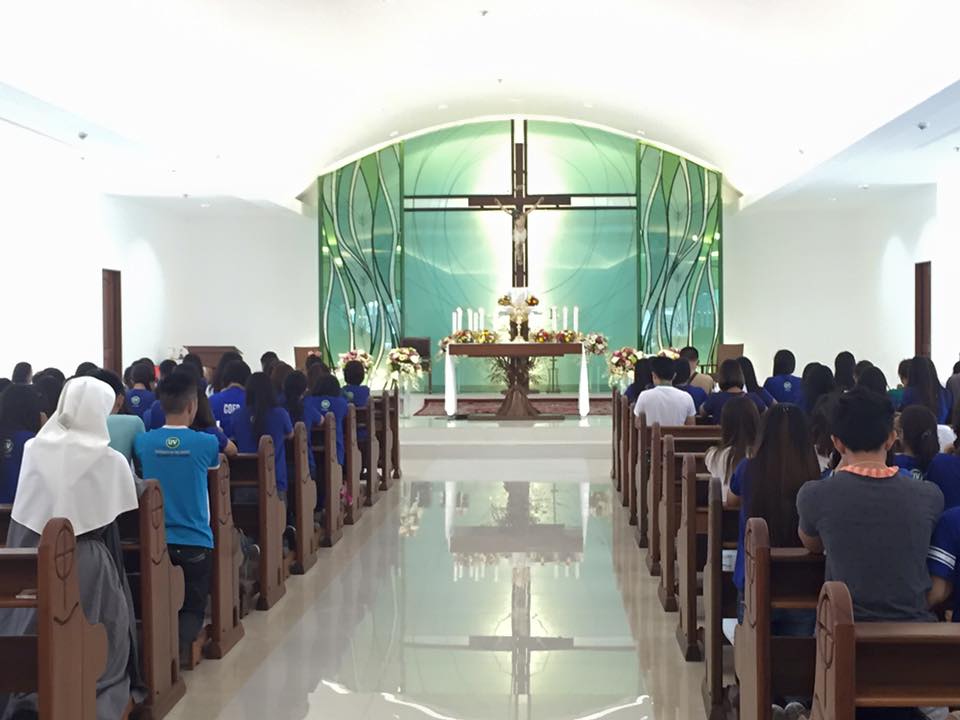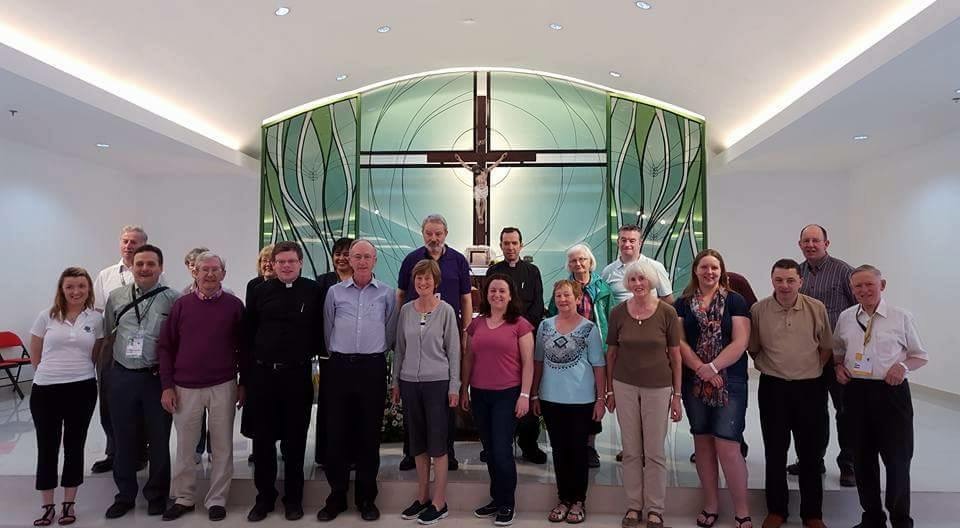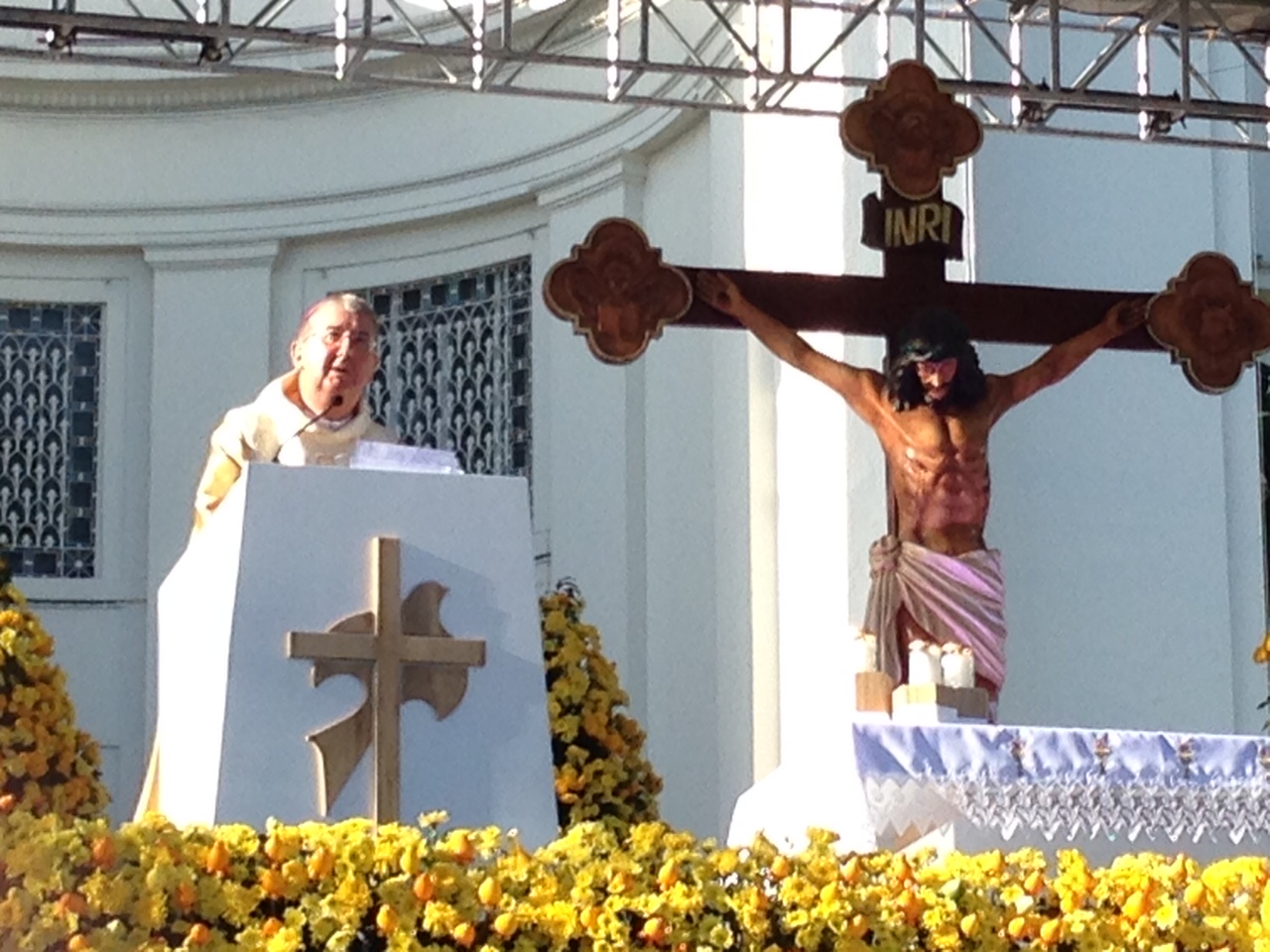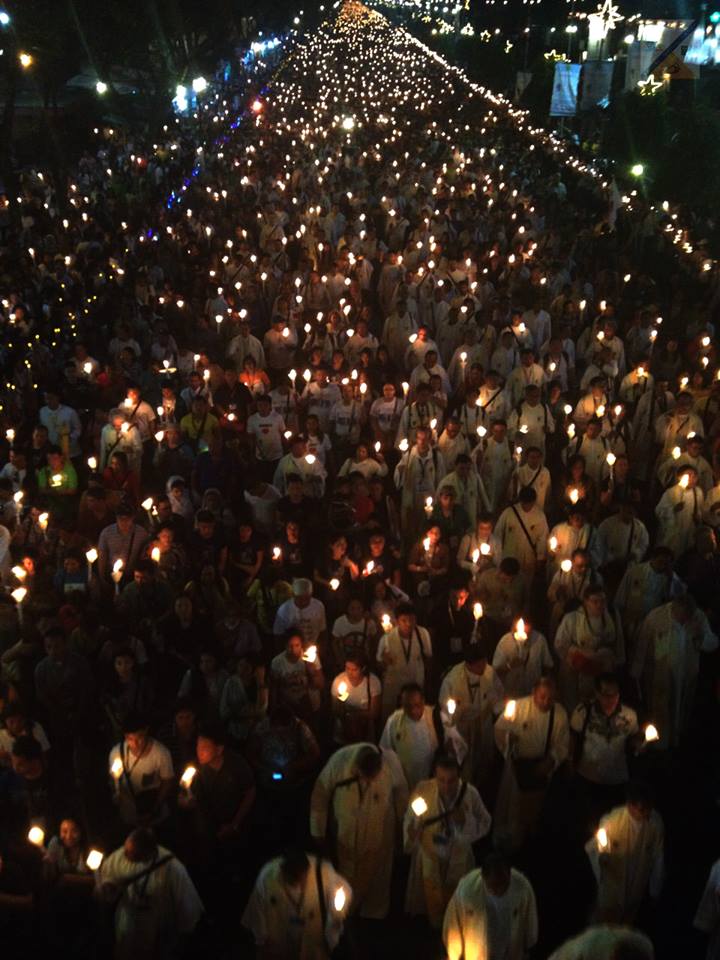
The Saint John Paul II Chapel in the IEC2016 pavilion in Cebu, Philippines where pilgrims to the IEC2016 are invited to go and spend time and avail of Sacrament of Reconciliation and Eucharistic Adoration. Pic from @IEC2016
The 51st International Eucharistic Congress is taking place in Cebu in the Philippines from 24 – 31 January. A total of 26 pilgrims, representing 11 Irish dioceses, are in Cebu for the Congress. The theme of the 51st International Eucharistic Congress is ‘Christ in You, Our Hope of Glory’. Archbishop Diarmuid Martin, who was President of IEC2012 in Dublin, will be the principal celebrant for the main Congress Mass on Friday 29 January in Cebu. Bishop Kevin Doran will be the main celebrant for the English language Mass on Wednesday 27 January. There will be fourteen language Masses in various parishes around Cebu that afternoon. Other Irish pilgrims involved in the Cebu Congress are Father John Coughlan from the Diocese of Elphin who will spoke at the Theology Symposium and Ms Frankie Berry, Chaplaincy to Deaf People, who will be speaking at a workshop on Thursday 28 January. Ms Anne Griffin, General Manager of IEC2012, is attending the Congress as part of the Holy See delegation along with Archbishop Piero Marini, the president of the Pontifical Committee for International Eucharistic Congresses, and his team.
Bishop Kevin Doran who was Secretary General of the IEC2012 in Dublin is blogging from the Cebu congress and we include his blogs below:
Day 10 Monday 1 February 2016
The Irish pilgrim group gathered this morning in the chapel of the Congress Pavilion to celebrate Mass for the Feast of St Brigid. The homily was delivered by Father Thomas O’Byrne from Kildare and Leighlin. We were joined by Father Carmello, head of the Communion and Solidarity Committee of the Congress. A collection was taken up for the Table of Hope project and this was presented to Father Carmello, together with a Saint Brigid’s Cross, made by Joan Geraghty, appropriately made from recycled drinking straws.
Day 9 Sunday 31 January 2016
Getting to the Statio Orbis (closing Mass) at the docks was a major logistical exercise but it was all done very expertly. The Mass celebrated by the Papal Legate, Cardinal Bo, was attended by more than a million people. Right beside the venue is a shanty town housing migrants from the Southern province of Mindanao. They are mainly of the muslim tradition. The poverty which is so evident alongside the development in Cebu is one of the challenges for Eucharist and the Church is Cebu seems to be very proactive in working for a more just and equitable society.
At the end of Mass, Cebu’s Archbishop Palma thanked all the pilgrims who had come from all around the world and made special reference to the 600 pilgrims from Taiwan, the largest overseas group. The Archbishop also welcomed the Irish pilgrims and acknowledged the assistance provided by the Congress team in Dublin in the preparation of the Cebu Congress. His words were followed by a message from Pope Francis to the assembled pilgrims, in the course of which he announced that the next Congress will take place in the Archdiocese of Estergom-Budapest in 2020.
+Kevin
Cebu, Philippines
Day 7 Friday 29 January 2016
The highlight of Friday 29 January for the Irish pilgrim group was the Mass celebrated by our own Archbishop Diarmuid Martin. Archbishop Martin spoke of two bishop colleagues with whom he had worked during his years in Rome, both of whom had spent time in concentration camps on in Dachau and one in Vietnam. Both experienced a deep sense of loss at being deprived of the Eucharist and, when they eventually managed to make simple arrangements for the celebration of the Eucharist, they also found that the Church became present in a new way in the camp. The message is clear: the Eucharist makes the Church.
At the end of Mass, Archbishop Martin warmly greeted the Filippino communities in Ireland and also those scattered around the world, sometimes in places where access to the Eucharist is very difficult.
The Mass was followed by a Eucharistic procession from the Capitol to Plaza Independencia, ll of 3.8km, in the intense evening heat. Auxiliary Bishop Antonio of Cebu, who is over 80, walked every step of the way.
+Kevin
Cebu, Philippines
Day 6 Thursday 28 January 2016
Cardinal Luis Antonio Tagle is a lot like Pope Francis. He can be very a very straight talker but he always does it with a bashful smile. The result is that his Catechesis at IEC2016 this morning was very challenging. He spoke on “The Eucharist and the Dialogue of Cultures”.
The cardinal began with a formal definition of culture, but then quickly suggested that we might find it easier just to ask ourselves a few questions like:
- how we use space in our gatherings,
- how we use language,
- who are heroes are,
- what is our attitude to knowledge and truth,
- what is our attitude to food,
- what is our attitude to time.
These are the kind of questions which reveal to us the nature of our culture. In some cultures, for example, we reward people for telling the truth, but in other cultures we punish them. In some cultures sitting down to eat together has far more social significance than in others.
Cardinal Tagle said that large organisations these days seek to employ people with well developed Cultural Intelligence. To be culturally intelligent means that:
- I know my own culture and how it affects me and impacts on my way of acting
- I study and try to learn, from within, the cultures of others
- I explore ways for our cultures to interact and learn from one another
We need, Cardinal Tagle said, to avoid the twin mistakes of either accepting or rejecting any idea or value uncritically. The Church engages in dialogue with cultures FOR mission, not just to be “the same”
One dialogue that needs to take place is the dialogue between the Christian culture of presence and participation on the one hand, and the alienating culture of depersonalisation which can sometimes be the experience of our homes and of our parishes
Another essential dialogue is the one between the Christian culture of gift, which we find particularly in the Eucharist, and the throw away culture in which things and even people are considered as disposable when they are of no further use or when to are perceived to be burdens.
Also speaking to us this morning was Mr Kei-Ichi Sugawara, a member of the minority Catholic. community in Japan. He spoke of how his town was devastated by the Tsunami which followed a hugh earthquake in Japan in 2011. A Video clip showed how a tranquil sea port town was literally washed away in just six minutes.
The key point of his testimony was that, while before the disaster, there was little engagement between the Japanese Catholic community and the large Filippino migrant population, the Japanese Catholics were challenged by the Tsunami – and by their own Eucharistic faith – to reach out to the migrants. Now the parish, with help from two missionary congregations is more vibrant and more inclusive, with two Filippinos serving on the parish council. The response to the disaster might have been very different if it were not for the Eucharist.
+ Kevin
Cebu, Philippines
Day 5 Wednesday 27 January 2016
In this morning’s Congress Programme, we were treated to a rather unusual testimony given by Mr Paul Ponce who grew up in a circus and is a highly renowned juggler. What is unique is that, in spite of his success he has placed his faith at the forefront of his life and uses his on-stage career to inspire and support faith in others.
The Catechesis on the Eucharist and the Environment was to have been delivered by Cardinal Peter Turkson, President of the Pontifical Council for Justice and Peace, but he was unable to come at the last minute and his excellent text was presented on his behalf by one of the Filippino bishops. The Cardinal made the point that in using natural elements such as bread and wine, water and oil in the liturgy, we are acknowledging “the Lord God of all creation” who has given us all of these things for our use, not just in the liturgy but also in everyday life. He noted that the “work of human hands” begins long before the liturgy as the wheat and the grapes are cared for, harvested and transformed into bread and wine and then delivered to the Church for Mass.
Cardinal Turkson referred to the traditional practice described in the middle of the second Century by St. Justin of bringing offerings for the poor with the Eucharistic offerings. “The taking and collecting of gifts for the Eucharist always implies the sharing of some of those gifts with the poor and needy” the Cardinal said. “The symbolism of the deacon as one who ministers both at the altar and to the poor outside the liturgy, personifies and exemplifies this ritual”.
A highlight of today’s Congress activities for the Irish delegation was our invitation to join the community at the Redemptorist parish of Our Lady of Perpetual Help in the city, for Mass followed by a community meal and entertainment. We were welcomed by the Parish Priest Fr. Chris Mostajo and by the rector of the seminary community, Fr. Tito Pascual. The parish was well chosen for us, because it was originally established by the Irish Redemptorists. We had the pleasure of meeting some Irish members of the present community who, between them have clocked up close on two hundred years of service to the Church in Cebu. They included Fr. Martin Tobin, Fr. Aidan McMahon, Fr. Noel Gartlan, Fr. Donoghue and Fr. Bill Skehan.
I was the principal celebrant and preacher and was joined for Mass by five Filippino bishops as well as Bishop Robert Byrne (auxiliary Bishop in Birmingham) and by Bishop Anthony Ademu Adaji of Idah, Nigeria, who was also accompanied by a group of pilgrims. Testimonies were given by John Howard (Eucharistic Adoration Apostolate) and Catriona Heffernan (Pure in Heart). To our surprise we discovered another group of fourteen Irish pilgrims who travelled separately. This brings the total number of pilgrims from Ireland to 37, not counting large numbers of Filippinos living in Ireland who have made sure to let us know that they are here.
Entertainment was provided by the Redemptorist Youth Ministry and by the Redemptorist Seminarians and included some extract from a musical play on the life of St. Alphonsus Ligouri. If there was one thing we could take home from this evening, and from our visit to Cebu in general it is the fact that the Church here is seriously engaged in the ministry to young people. It happens in the parishes and it is not given over to state agencies. There is an intimate relationship between the active engagement of young people in the life of the Church and the large numbers presenting as candidates for priesthood and religious life. Serious on-going ministry involving young people is not an option, it is an imperative.
+Kevin
Cebu, Philippines
Day 4 Tuesday 26 January 2016
People at home will be interested to hear that it also rains in Cebu – and quite heavily. It has scarcely stopped over the past 24 hours and it is putting the IEC volunteers under pressure to keep the venue entrance clean and dry. Warm rain is a change, but it’s just as wet.
One our keynote speakers today was the US evangelist and now auxiliary bishop of Los Angeles, Robert Barron, who is known to many as the face of Word-on-Fire ministries. His theme was the Eucharist and the Paschal Mystery. He commented on the Gospel account of the two disciples on the way to Emmaus (Lk 24) which was so central to our own preparation for IEC2012. He pointed out that, in the Gospels, all the journeys seem to lead to Jerusalem. The two disciples, by contrast, were leaving Jerusalem. Could it be possible, Bishop Barron wondered, that they were unable to recognise Jesus because, in a spiritual sense, they were walking “the wrong way”. It was at the table of the Eucharist that “their eyes were opened” and they literally (and spiritually?) began to retrace their steps to Jerusalem. Jerusalem is associated with sacrifice and it is where Jesus laid down his life. The disciples, who had turned their backs in sacrifice, now returned to Jerusalem.
Bishop Barron commented that, over the centuries, many of the key precepts of the Gospel, such as “love your neighbour” have been “honoured in the breach”. Oddly the one that has consistently been observed is “Do this in memory of me”. Why are we now seeing such a widespread letting go of this most fundamental Christian observance”, he asked.
The National Delegate from Belgium, theologian Marianne Servaas gave a very moving testimony about her encounter with the Catholic faith during a period when she was working in the Philippines. The joyful celebration of a vibrant faith, without the usual European preoccupation with correctness, was something she had never experienced before. It was encapsulated for her in the Easter Vigil, to which she went on the invitation of friends and in the experience of devotion associated with the elevation of the host at Mass.
Marianne described how, in the Philippines, she made the decision to be a Catholic and later began her theological studies in Manila. Pointing out that Belgium used to be, like the Philippines, a most Catholic and deeply religious culture, she appealed to the people of the Philippines not to make the mistake of turning away from their faith as so many in Europe have done in recent generations. The Filippinos now carry the hope of all of us.
+Kevin
Cebu, Philippines
Days 2 & 3 Sunday 24 and Monday 25 January 2016
IEC2016 was officially launched with the opening Mass at Plaza Independencia in Cebu City on Sunday afternoon. This huge open space, used for all sorts of public events and concerts, is dominated by Forte San Pedro, an impressive fortress dating from the time of the Spanish occupation. Archbishop Jose Palma, welcoming the Papal Legate, Cardinal Charles Maung Bo of Myanmar (Burma), commented that Forte San Pedro was a very appropriate backdrop for the celebration of Mass by the Legate, who represents among us the ministry of St, Peter.
Cardinal Bo spoke of how the Filippino people had been the first to welcome refugees from the military dictatorship in Burma and how the Filippinos were now known far and wide, not just in Asia but in the rest of the world as migrants who brought with them the gift of faith. The huge crowd listened attentively as the Cardinal, while endorsing the spirit of devotion among the Filippino people, told them that devotion is good, but it is not enough on its own. Faith has to find expression in action, in defense of justice and of innocent human life. “The Mass of the devotee ends in an hour, but the Mass of the disciple is unending,” the Cardinal said reminding them that true devotion is not confined to the corners of Churches, “but goes out to the streets to affirm the human dignity”.
One of the striking differences between this Congress in Cebu and our Congress in Dublin, not surprisingly, is the number of delegates from Asia, and this is reflected in the languages used both in the liturgy and for announcements. Among old friends from 2012 are many familiar faces from Taiwan and Vietnam. Canada and Brazil are also well represented and there are quite a few Australians.
We have met Irish missionaries as well as Filippinos currently working and living in Ireland who have included the Congress as part of a family visit. It is truly good for us to be here.
The years of planning here in Cebu appear to have paid off. Regular colour-coded shuttle buses take pilgrims from hotels to venues and back again very efficiently. Pilgrims have also been impressed with the variety and quality of food provided at the venue and the speed of distribution. One remarkable achievement has been the construction of a permanent multi-purpose venue on the site of the seminary, which includes an indoor “arena” for the liturgies and the keynote addresses, as well as a prayer space, a media centre, an exhibition space and a dining hall. This will continue to serve the local Church long after the Congress is over.
The new venue had its first major test on Monday morning when delegates gathered to listen to a Catechesis on the theme: “Christ in you, the Hope of Glory” delivered by Peruvian Capuchin Archbishop, Miguel Cabrejo Vidarte. The Archbishop emphasised the universality of the call to discipleship and salvation, a message which has particular significance her in Asia.
The Catechesis was followed by a personal testimony in which Cardinal Zen, retired (Salesian) Archbishop of Hong Kong, asked that the world would not forget leading Catholics, including clergy and young members of the Legion of Mary who have suffered – and in some cases still suffer – for their faith at the hands of the communist regime in China. This he commented is usually regarded as too delicate to be mentioned when international talks with China are taking place. Cardinal Zen is himself a native of Shanghai. Mass was celebrated for thousands of delegates on Monday morning by Archbishop Piero Marini, President of the Pontifical Committee for Eucharistic Congresses.
+Kevin Doran
Cebu, Philippines
Day 1 Saturday 23 Jan 2016
The Irish delegation for IEC2016, numbering 23 people, arrived in Cebu, Philippines on Friday evening after a long journey via London and Cebu. We were warmly greeted by the volunteers at Cebu, Mactan airport.
Registration this morning at Pope John XXIII seminary looked as if it could be problematic, given the large numbers, but it all went very smoothly thanks to the patience and friendliness of the volunteers.
We had the privilege then of joining the street children of Cebu for a Table of Hope, arranged bt the Solidarity and Communion Committee, in partnership with the Archdiocese of Vancouver, Canada. This event, which began with Mass, was an opportuinty for us the meet and eat with the children, five hundred of whom celebrated their first communion. This is part of a long term project of catechesis and basic education for street children, which is geared to helping them move into mainstream education. Bishop Kevin led the closing prayer and blessing, based loosely on the Canticle of the Creatures by St Francis of Assisi.
Temperatures here are in the mid-to high twenties. When we set out this morning to walk the fifteen minutes to the venue, the people in the hotel looked at us as if we were crazy and, when they realised we were serious, they sent a member of the security staff with us to make sure we got there ok. Talk about feeling welcome.
+Kevin
Cebu, Philippines




